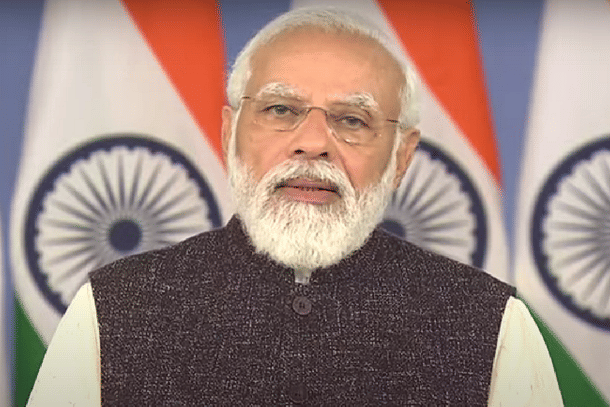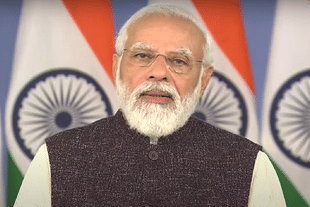News Brief
State Elections Were First Test For INDI Alliance, People Rejected Them: Eight Highlights From PM Modi's Latest Interview
Kuldeep Negi
Dec 18, 2023, 10:04 AM | Updated 10:04 AM IST
Save & read from anywhere!
Bookmark stories for easy access on any device or the Swarajya app.


Terming the recently concluded Assembly elections, in which BJP emerged victorious in three out of the four states that went for polls, as the first test of the INDI Alliance, Prime Minister Narendra Modi has said that the people rejected the Opposition bloc and its selfish politics.
In an interview with Hindi daily Dainik Jagran, PM Modi expressed his views on various issues including the Ram Mandir inauguration and the upcoming 2024 general elections.
Here are the highlights from PM Modi's interview:
State wins mandate for stable, service-oriented governance
PM Modi highlighted that these state election results, which came just a few months before the Lok Sabha elections, should be interpreted as a public mandate for stable, permanent, and service-oriented governance.
He mentioned the transformation of the UPA into a new form, INDI Alliance (the opposition alliance), and described the state elections as a critical test for this new alliance, which, in his view, they failed.
Further, he stated that the electorate has rejected the politics of instability and selfishness, interpreting the results as an indication of the country's mood.
"In a way, this was the first test for INDI Alliance, and in this test, the public has rejected the opposition alliance. The public has completely rejected the politics of instability and selfishness. These election results have also given a glimpse of the mood of the country. The public has given a mandate for a stable, permanent, and service-oriented government in the interest of the nation," he said.
Modi also addressed the perception that while the BJP faces no challenge at the national level, it is not receiving as much support in the states. He countered this by mentioning the party's formation of governments in three states and a significant increase in the BJP's vote percentage in Telangana, viewing these achievements as indicators of a potential historic victory in the 2024 elections.
Modi's guarantee
In the interview, PM Modi reflected on the recent state election victories, where the BJP campaigned prominently in his name, leading to unprecedented results.
He emphasised that this approach, symbolized as 'Modi's guarantee', resonated with the voters, indicating a successful strategy that could be significant in future elections.
Modi elaborated on the concept of 'guarantee', explaining that it encompasses four main criteria: policy, intention, leadership, and work track record.
He argued that a true guarantee is based on fulfilling these criteria, rather than being an empty promise.
Modi's guarantee, he said, is underpinned by the public's observation of his government's past actions and policies.
He cited the example of his government building four crore houses for the poor over the past nine years, and his promise to build two crore more, asserting that such commitments have earned the public's trust. He also mentioned the free grain scheme during the COVID-19 crisis as an example of his government's commitment to the needy, which he plans to extend for the next five years.
Furthermore, Modi discussed visible transformations in infrastructure, particularly in the railways, as evidence of effective governance.
He stressed that the trust between the government and the public forms the foundation of Modi's guarantee, illustrating his administration's efforts to directly address the needs of the people, contrasting it with past eras of unfulfilled promises and ineffective governance.
Electoral Victories and Opposition's Tactics
PM Modi emphasized that the BJP's recent state election victories were not exclusively against Congress. He noted the opposition's strategy of fielding candidates to split BJP votes, asserting that the public recognized and rejected these tactics.
Modi expressed confidence in the public's discernment, believing they wouldn't be swayed by the opposition's misinformation.
North-South Electoral Dynamics
Addressing the debate on electoral outcomes in North vs South India, Modi dismissed it as a baseless narrative propagated by the opposition.
He stressed that the Indian populace does not believe in such divisive politics and that such debates arise from a lack of substantive ideology among certain political factions.
Economic Growth and Welfare Schemes
PM Modi highlighted India's economic resilience amidst global challenges. He pointed out the country's robust growth rates and increasing confidence among national and international investors.
Modi emphasized that the growth in economic strength should translate into improved living standards for every citizen, underscoring the importance of welfare schemes in empowering the poor and strengthening the nation.
Leadership and Governance
On the topic of choosing new and relatively unknown faces for Chief Ministers in three states, Modi explained this as a reflection of BJP's cadre-based structure.
He argued that in BJP, even those who rise to prominent positions retain their identity as party workers, emphasizing a departure from traditional dynastic politics. This approach, according to Modi, allows for the recognition and utilization of talent within the party, irrespective of their media visibility.
Ram Mandir Construction
PM Modi expressed profound satisfaction about the nearing completion of the Ram Mandir.
He described the opportunity to visit the temple on its inauguration as a significant moment, not just as the Prime Minister but also as a common citizen.
Modi reflected on the temple's spiritual significance and its deep-rooted connection with the Indian populace.
He considered the event as a collective moment of joy and contentment for the entire nation, symbolizing a cultural and spiritual milestone.
Article 370 and Kashmir
PM Modi discussed the Supreme Court's decision upholding Centre's abrogation of Article 370, which granted special status to Jammu and Kashmir.
He stated that the Court's decision underscored the principle that a single nation couldn't operate under two sets of laws.
The PM emphasized that the abrogation of Article 370 was crucial for the development and welfare of the people of Jammu and Kashmir and Ladakh.
He criticized previous family-centric political strategies in the region and voiced his confidence in the region's positive transformation post the abrogation, citing increased tourism and reduced violence.
Kuldeep is Senior Editor (Newsroom) at Swarajya. He tweets at @kaydnegi.





